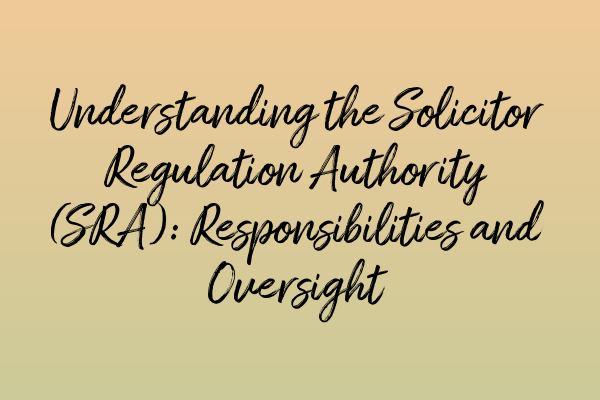Understanding the Solicitor Regulation Authority (SRA): Responsibilities and Oversight
Welcome to Become Solicitor SRA, your go-to source for all things related to becoming a solicitor in the UK. Today, we will delve into a crucial aspect of the legal profession – the Solicitor Regulation Authority or SRA. As a future solicitor, it is essential to have a comprehensive understanding of the responsibilities and oversight carried out by the SRA.
The SRA is an independent regulatory body that governs solicitors and law firms in England and Wales. Its primary role is to ensure that solicitors provide high-quality legal services and maintain the utmost professionalism and ethical standards. By setting and enforcing strict regulations, the SRA aims to protect clients and uphold the integrity of the legal profession.
Now, let’s explore the key responsibilities of the SRA:
1. Regulation and Authorization:
The SRA is responsible for authorizing individuals and entities to practice as solicitors. This involves evaluating the suitability and competence of prospective solicitors, assessing their qualifications, and granting them admission to the legal profession. By overseeing the admission process, the SRA ensures that only qualified individuals are allowed to provide legal services.
2. Setting and Enforcing Standards:
To maintain a high level of professionalism, the SRA establishes detailed standards and regulations that solicitors must adhere to. These standards cover a wide range of areas, including client care, professional conduct, financial management, and anti-money laundering measures. Solicitors are obligated to meet these standards throughout their careers, ensuring that clients receive excellent service and protection.
3. Monitoring and Supervision:
The SRA monitors solicitors and law firms to ensure compliance with its regulations. Regular assessments, inspections, and examinations are conducted to assess the quality of legal services provided. By implementing a robust monitoring and supervision system, the SRA can identify potential risks, address misconduct, and maintain public confidence in the legal profession.
4. Handling Complaints:
The SRA offers a comprehensive complaints-handling service for clients who have concerns about the conduct or services of solicitors. When a complaint is received, the SRA thoroughly investigates the matter, assesses the evidence, and takes appropriate action if any wrongdoing is found. This process is crucial as it demonstrates the SRA’s commitment to holding solicitors accountable for their actions and ensuring client satisfaction.
5. Disciplinary Proceedings:
In cases of serious professional misconduct, the SRA may initiate disciplinary proceedings against solicitors. This may result in sanctions such as fines, reprimands, suspensions, or in extreme cases, striking off the solicitor’s name from the roll. Disciplinary proceedings act as a deterrent and maintain the integrity of the legal profession.
The SRA’s oversight of solicitors and law firms is essential to protect the interests of both clients and the legal profession itself. The regulatory body plays a vital role in ensuring that solicitors uphold the highest standards of professionalism, ethics, and integrity.
At Become Solicitor SRA, we are committed to providing you with valuable information and resources to navigate your journey towards becoming a solicitor. To further enhance your knowledge, we recommend checking out these related articles:
– A Closer Look at the Bar Professional Training Course (BPTC)
– The Role of Technology in Modern Legal Practice
– A Look into Prominent Law Firms in the UK
– Debunking Common Misconceptions about Solicitors
– Networking Strategies for Solicitors: Building a Strong Professional Network
By exploring these articles, you will gain valuable insights into various aspects of the legal profession, which will further enhance your understanding of the Solicitor Regulation Authority’s role and responsibilities.
In conclusion, the Solicitor Regulation Authority plays a pivotal role in regulating and overseeing solicitors and law firms. By establishing and enforcing high standards, handling complaints, and conducting disciplinary proceedings, the SRA ensures the integrity and professionalism of the legal profession. As a future solicitor, it is essential to have a thorough understanding of the SRA’s responsibilities and oversight to excel in your legal career.


Leave a Reply